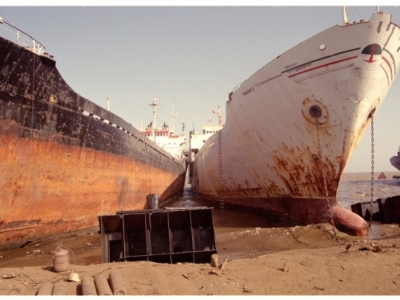Ships litter Nigerian coast
The powerful waves of the Atlantic Ocean crash against rusting hulks beached along the coastline just outside Nigeria’s largest city as lines of cargo ships waiting to come to port stretch across the western horizon.
Government officials say they don’t know how many abandoned ships choke Nigeria’s waterways, but they cause tremendous environmental and navigational hazards. And as more wash ashore daily, the massive vessels cause fast-moving erosion along Nigeria’s beaches that can tear away more than a half-mile of shoreline in a matter of days, experts say.
“Shorelines are supposed to seasonally increase and decrease,” said Ikenna Onyema, a professor of marine sciences at the University of Lagos. “When a man-made structure comes in between, it cuts out its life.”
Forgotten ships rust across Nigeria’s roughly 525-mile coastline while others can be seen partially submerged on inland waterways and creeks. Some have been there for decades while others only days.
Many, abandoned after the lucrative theft of crude oil, serve as hulking metaphors for the lawlessness that plagues Nigeria.
The history of abandoned ships in Nigeria is intertwined with the slowly growing, strangling grip of corruption the nation has faced since it gained its independence from Britain in 1960.
The first such ships came amid the booming trade of importing cement into the country during the massive projects of former military ruler Gen. Yakubu Gowon in the early 1970s.
Ships backed up for miles with cement, waiting as long as a year to come into the country. Only later did officials acknowledge much of the cement was inferior, and companies put their ships in line to collect fees for being kept waiting. Some of the cement hardened in ships’ holds, sinking the vessels.
Today, it appears many of the boats left to rust along the coast belong to the increasingly lucrative industry known locally as “bunkering” – stealing the crude oil pumped out of Nigeria’s oil-rich southern delta by foreign companies. The CEO of Royal Dutch Shell PLC, the dominant firm in Nigeria, has estimated thieves steal about 150,000 barrels of oil a day from the region by drilling or sawing into pipelines to install their own spigots.
From the air, one can see the wooden ships that carry crude through the Niger Delta’s winding creeks to makeshift refineries to cook into crude diesel and kerosene. Much of the oil, however, makes it to large tankers that then carry the oil out to sea and into the black market.
Those tankers are later discarded along the coast. Outside Lagos at Tarkwa Bay, about a dozen abandoned vessels dot the coastline, including one from Zenon Petroleum & Gas Ltd., run by billionaire Femi Otedola, a supporter of President Goodluck Jonathan.
Coves in the area are being rapidly destroyed by ships, which deflect the force of waves in a different way, causing massive erosion, said Onyema, the professor. Oil from the ships and other debris cause damage as well, he said.
Yet the ships remain on the beaches. Ziakede Akpobolokemi, director-general of the Nigerian Maritime Administration and Safety Agency, told The Associated Press in a recent interview the ships would be removed – but could not say when or exactly how many abandoned vessels there are. In August, Nigeria’s Transport Minister Yusuf Suleiman promised to remove the wrecks within weeks, though nothing was done.
“No sane-minded man or person should be happy with such a situation when abandoned vessels can cause environmental problems, when they can cause navigation problems, when they can aid and abet criminal activity,” Akpobolokemi said. “Why should you be happy?”
Although the government hasn’t begun removing the ships, others have. Groups of salvagers move along the coast, removing whatever electronics and communication gear remains inside. Gas tanks and blow torches follow, leaving behind exposed metal skeletons along the beach.
But that scavenging takes months, as the heavy waves carry in new ships all the time.
Source: AP






























































